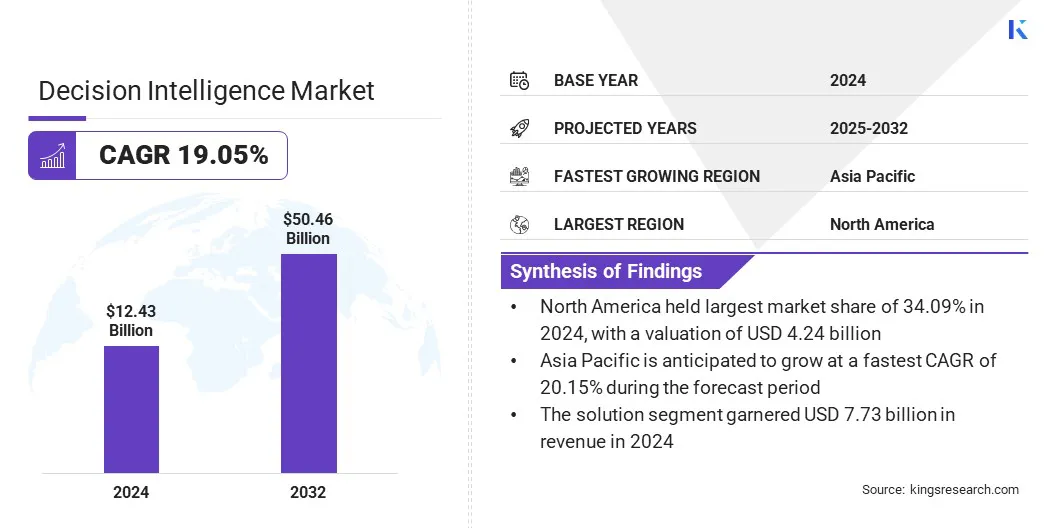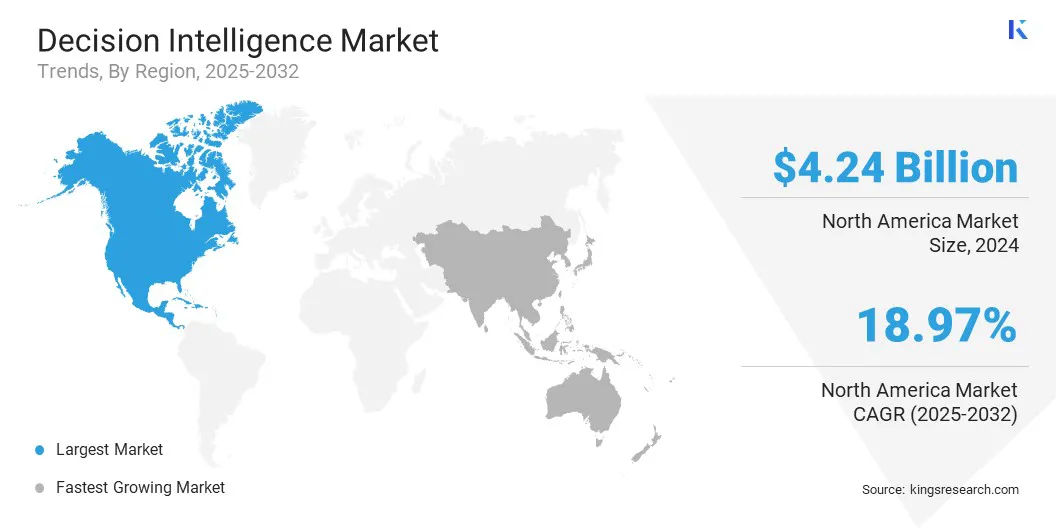Market Definition
Decision intelligence is a structured framework that combines data science, artificial intelligence, and business intelligence to enhance decision-making. It integrates analytics, predictive modeling, and automation to translate complex data into actionable insights. This approach supports both strategic and operational decisions, helping organizations optimize performance, reduce uncertainty, and align actions with measurable business objectives.
Decision Intelligence Market Overview
The global decision intelligence market size was valued at USD 12.43 billion in 2024 and is projected to grow from USD 14.74 billion in 2025 to USD 50.46 billion by 2032, exhibiting a CAGR of 19.22% during the forecast period.
This growth is primarily driven by accelerating digital transformation initiatives that enhance enterprise data ecosystems. Organizations are increasingly investing in AI-driven analytics for real-time insights, and operational agility.
Key Highlights:
- The decision intelligence industry size was recorded at USD 12.43 billion in 2024.
- The market is projected to grow at a CAGR of 19.22% from 2025 to 2032.
- North America held a share of 34.09% in 2024, valued at USD 4.24 billion.
- The solution segment garnered USD 7.73 billion in revenue in 2024.
- The cloud-based segment is expected to reach USD 27.96 billion by 2032.
- The small and medium enterprises segment is anticipated to witness the fastest CAGR of 19.41% over the forecast period.
- The BFSI segment is estimated to hold a share of 24.29% by 2032.
- Asia Pacific is anticipated to grow at a CAGR of 20.15% through the projection period.
Major companies operating in the decision intelligence market are IBM Corporation, Aera Technology, Oracle, TATA Consultancy Services Limited, Provenir, Alphabet Inc. (Google), Board International, Domo, Inc., H2O.ai, Inc., Intel Corporation, ClearBox Decisions, Inc., Pyramid Analytics BV, SAS Institute Inc., Tellius, and Quantexa Ltd.

Integration of decision intelligence with enterprise software ecosystems is enhancing data accessibility and analytical precision across operations. Organizations are embedding decision intelligence within ERP, CRM, and supply chain systems to automate insights and optimize decision workflows.
By unifying data sources within a single intelligence framework, enterprises enhance predictive modeling, performance tracking, and risk assessment, enabling faster, data-driven decisions and greater business agility.
- In October 2025, Altair introduced major updates to Altair RapidMiner, its unified data analytics and AI platform, designed to operationalize intelligence and integrate human insight with automation. The enhancements modernize SAS environments, streamline migration to open, cloud-ready ecosystems, and improve collaboration and flexibility for both technical and business users.
How are advancements in AI, ML, and big data analytics fueling the adoption of decision intelligence solutions?
Advancements in artificial intelligence, machine learning, and big data analytics are strengthening the analytical foundation of decision intelligence platforms. These technologies facilitate automated pattern recognition, predictive forecasting, and prescriptive recommendations across complex data environments.
By leveraging vast datasets for real-time insights, the integration of AI and ML enhances decision accuracy, scalability, and adaptive learning. This enables decision support systems to evolve continuously based on new data inputs and improve enterprise decision-making precision and efficiency.
- In September 2024, Oracle introduced new AI-powered capabilities for Oracle Fusion Data Intelligence to help organizations maximize data value and enhance competitiveness. The update introduces intelligent applications within Oracle Fusion Cloud HCM and SCM, providing actionable insights that extend beyond traditional analytics to support critical operational decisions.
Why does the challenge of interpreting AI-generated recommendations act as a barrier to the growth of the decision intelligence market?
The complexity of interpreting AI-driven recommendations often makes it difficult for decision-makers to understand algorithmic logic, resulting in hesitation to adopt automated insights. The lack of transparency in machine learning models and limited interpretability of predictive outputs reduce user confidence. This restricts the practical application of decision intelligence tools, as organizations struggle to translate complex data analytics into actionable, strategy-aligned decisions.
To address this challenge, enterprises are adopting explainable AI frameworks, enhancing model transparency, and integrating visualization dashboards that clarify decision pathways. These approaches strengthen trust, accountability, and data-driven adoption across enterprise functions.
Why are organizations adopting cloud-enabled decision intelligence frameworks to enhance enterprise operations?
Integration of decision intelligence platforms with cloud ecosystems is reshaping enterprise analytics by enabling scalability, flexibility, and real-time accessibility. Cloud-based deployment allows organizations to manage large datasets efficiently and improve cross-functional collaboration. This trend facilitates faster data processing, lower infrastructure costs, and seamless integration with existing enterprise systems.
The combination of decision intelligence and cloud infrastructure is enhancing operational agility, supporting continuous decision optimization, and driving adoption across industries seeking data-driven transformation.
- In June 2025, MathCo collaborated with Snowflake to advance AI-led decision intelligence. The partnership focuses on accelerating AI-driven innovation, delivering joint customized solutions, and enabling clients to maximize data value through the integration of MathCo’s enterprise AI expertise and Snowflake’s platform, while also expanding MathCo’s Snowflake-certified workforce.
Decision Intelligence Market Report Snapshot
|
Segmentation
|
Details
|
|
By Component
|
Solution, Services
|
|
By Deployment
|
Cloud-based, On-premises
|
|
By Organization
|
Small and Medium Enterprises, Large Enterprises
|
|
By Vertical
|
BFSI, IT & Telecommunications, Retail & Ecommerce, Healthcare, Manufacturing, Government, Others
|
|
By Region
|
North America: U.S., Canada, Mexico
|
|
Europe: France, UK, Spain, Germany, Italy, Russia, Rest of Europe
|
|
Asia-Pacific: China, Japan, India, Australia, ASEAN, South Korea, Rest of Asia-Pacific
|
|
Middle East & Africa: Turkey, U.A.E., Saudi Arabia, South Africa, Rest of Middle East & Africa
|
|
South America: Brazil, Argentina, Rest of South America
|
Market Segmentation
- By Component (Solution and Services): The solution segment generated USD 7.73 billion in revenue in 2024, mainly due to growing adoption of AI-driven analytics platforms enabling automated decision-making and enhanced business process optimization across industries such as BFSI and healthcare.
- By Deployment (Cloud-based and On-premises): The cloud-based segment is poised to record a CAGR of 19.32% through the forecast period, propelled by increasing enterprise preference for scalable infrastructure, cost efficiency, and real-time decision intelligence accessibility.
- By Organization (Small and Medium Enterprises and Large Enterprises): The large enterprises segment is estimated to hold a share of 58.97% by 2032, fueled by the widespread adoption of decision intelligence systems for complex data management and strategic automation.
- By Vertical (BFSI, IT & Telecommunications, Retail & Ecommerce, Healthcare, Manufacturing, Government, Others): The BFSI segment is projected to reach USD 12.26 billion by 2032, owing to rising adoption of AI-enabled decision intelligence for fraud detection, risk assessment, and customer experience optimization.
What is the market scenario in North America and the Asia Pacific region?
Based on region, the global decision intelligence market has been classified into North America, Europe, Asia Pacific, Middle East & Africa, and South America.

North America decision intelligence market accounted for a 34.09% share in 2024, valued at USD 4.24 billion. This dominance is supported by strong enterprise digitalization initiatives, extensive adoption of AI-driven analytics, and integration of decision intelligence solutions within existing business intelligence systems.
Organizations across the manufacturing, BFSI, and healthcare sectors are utilizing predictive modeling and advanced data visualization to strengthen decision-making capabilities. Increasing investments in cloud-based analytics infrastructure and AI research are further supporting regional market expansion. The strong presence of established technology providers and early adoption of automation technologies continue to reinforce the region’s competitive edge and market growth.
- In April 2025, Snowfire AI launched its patent-pending adaptive AI platform designed for business executives. The platform leverages proprietary technology to contextualize intelligence from billions of data points, enabling global leaders to transform internal and external data into strategic assets for real-time decision-making.
The Asia Pacific decision intelligence industry is set to grow at a CAGR of 20.15% over the forecast period. This growth is driven by the rising integration of advanced analytics and AI technologies across enterprises, enabling data-centric operations and improved strategic decision-making capabilities. Rapid expansion of data-driven industries and increasing adoption of AI, ML, and analytics platforms are further fueling this expansion.
Organizations are focusing on deploying decision intelligence tools to streamline business operations, optimize workflows, and enhance real-time decision processes. Government initiatives supporting AI integration, growing cloud adoption, and investments in advanced analytics infrastructure are further stimulating domestic market growth.
Regulatory Frameworks
- In the EU, the General Data Protection Regulation (GDPR) governs the collection, processing, and storage of personal data. It ensures transparency, accountability, and user consent in AI-based decision-making systems.
- In the U.S., the California Consumer Privacy Act (CCPA) enforces data privacy rights and transparency obligations, directly affecting decision intelligence solutions that leverage user analytics.
- In Canada, the Personal Information Protection and Electronic Documents Act (PIPEDA) mandates responsible handling of personal information, guiding ethical deployment of AI-driven decision intelligence tools.
- In the UK, the UK Data Protection Act (DPA) supervises the lawful processing of personal and business data. It ensures that decision intelligence applications maintain compliance and mitigate risks of misuse in automated systems.
- In Australia, the Privacy Act 1988 oversees the use of personal information in digital ecosystems, requiring compliance from organizations adopting AI and machine learning-based decision intelligence technologies.
- In Singapore, the Personal Data Protection Act (PDPA) directs the management of personal data, reinforcing transparency and accountability in decision intelligence frameworks.
- In Japan, the Act on the Protection of Personal Information (APPI) mandates fairness, security, and accountability in algorithmic decision-making processes.
- In India, the Digital Personal Data Protection Act (DPDPA) 2023 defines digital data privacy and processing norms, ensuring compliance for AI-driven decision intelligence systems.
Competitive Landscape
Key players operating in the decision intelligence industry are advancing AI-driven analytics platforms and strengthening their portfolios through continuous innovation. Strategic mergers, acquisitions, and technology partnerships are expanding product capabilities and addressing emerging applications.
Enterprises are investing in cloud-native architectures, explainable AI frameworks, and real-time data integration systems to enable scalable deployment. Vendors are focusing on sector-specific solutions, predictive and prescriptive analytics, and regional expansion to sustain growth and maintain competitive differentiation.
- In September 2025, Provenir announced that Türk Ekonomi Bankası (TEB) had adopted the Provenir AI Decisioning Platform to accelerate batch risk decisioning for retail and small business lending. The implementation aims to enhance decision speed, agility, and scalability to support its expanding customer base and strengthen market competitiveness.
Key Companies in Decision Intelligence Market:
- IBM Corporation
- Aera Technology
- Oracle
- TATA Consultancy Services Limited
- Provenir
- Alphabet Inc. (Google)
- Board International
- Domo, Inc.
- ai, Inc.
- Intel Corporation
- ClearBox Decisions, Inc.
- Pyramid Analytics BV
- SAS Institute Inc.
- Tellius
- Quantexa Ltd.
Recent Developments (Product Launches)
- In October 2025, Sapiens International Corporation launched Decision Analytics, a module within the Sapiens Decision Platform designed to provide real-time visibility into decision-making processes. The solution enables performance monitoring, analyzes outcomes, and supports continuous optimization across business and technology functions.
- In February 2023, Alteryx, Inc. enhanced its Alteryx Analytics Cloud Platform with new self-service and enterprise-grade capabilities to accelerate data-driven decision-making. The upgraded platform integrates Designer Cloud with a modern drag-and-drop interface, offering broader accessibility while ensuring robust data governance and security compliance.


